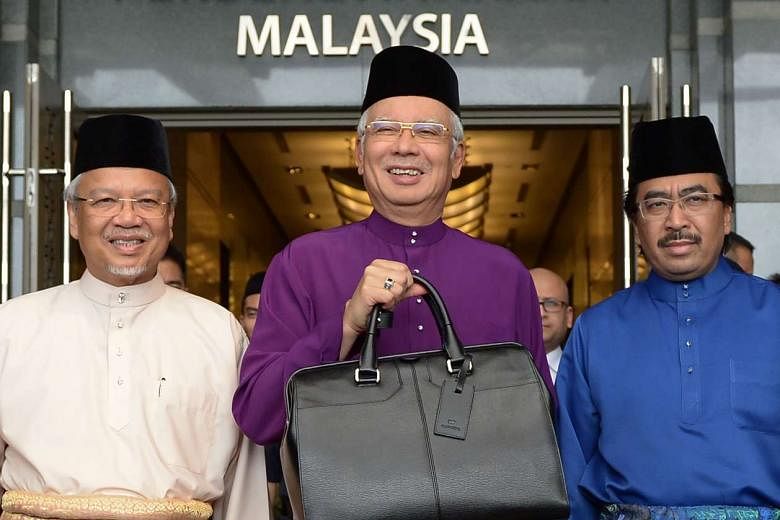KUALA LUMPUR - Prime Minister Najib Razak eked out extra cash handouts for poor Malaysians and tax reliefs for middle-income earners who are facing rising living costs despite having limited room to manoeuvre in the Budget 2016 unveiled late Friday.
Faced with headwinds from slower global growth, Malaysia is trimming its expected economic growth next year to between 4 and 5 per cent, and delaying its long-term plan to eliminate government overspending, as Datuk Seri Najib seeks to shore up public confidence in his leadership by raising spending.
Gross Domestic Product (GDP) is estimated to grow by 4.5 to 5.5 per cent this year, and expanded by 6 per cent in 2014.
But Mr Najib, who is also Finance Minister, insisted that Malaysia has effectively overcome the impact of the global slowdown, declining commodity prices and the depreciation of the ringgit.
"In this context, we have to remember that there is no comparison whatsoever between the current economic situation with 1998," he said in Parliament, referring to the Asian financial crisis which saw Malaysia's economy contracting by 7.4 per cent that year.
The fiscal deficit will trim slightly from 3.2 per cent of GDP this year to 3.1 per cent in 2016, falling behind a timeline Mr Najib had set earlier where overspending should fall below 3 per cent next year, as he strives towards a balanced budget by 2020 - by which time Malaysia would've recorded over two decades of deficit.
Government revenue is only expected to inch up just 1.4 per cent despite a full-year of Goods and Services Tax (GST) being levied.
The 6-per-cent broad-based consumption tax has been a major source of public dissatisfaction since it was introduced in April, leading Mr Najib to stress its importance given the impact of oil prices halving since last year.
Oil-based revenue contributed 30 per cent of Treasury collections last year, but shrank to RM44 billion this year from RM62 billion in 2014. It is expected to slip further to RM31.7 billion next year.
Instead, GST is set to bring in an additional RM27 billion this year, and will rake in RM39 billion in 2016.
"In 2016... if GST was not implemented... government revenue would be lower by RM21 billion. If this were to happen, the government would have been forced to borrow, including to pay civil servants' salaries," he said.
The Prime Minister announced that annual payouts ranging from RM400 to RM1,050 will be offered to 4.7 million households earning under RM4,000 per month and 2.7 million individuals living on RM2,000 or less. The programme will cost RM5.9 billion next year, up from RM5.2 billion allocated this year.
For those earning enough to incur income tax, reliefs for the care of children and parents was increased, although those with taxable incomes above RM600,000 per annum saw their tax rates raised.
Analysts however said that while the budget was sensitive to the needs of the public, it failed to equip Malaysians to face potentially worsening economic conditions.
"China may continue its slowdown and the challenges may get tougher. The Prime Minister has not prepared the public," said independent economist Hoo Ke Ping.
The Najib administration will spend RM267.2 billion, up by 2.5 per cent, in 2016, with RM52 billion in development expenditure, against revenue of RM225.7 billion.
Consumer inflation has come in at 1.9 per cent in the year-to-date, far lower than projected due to the decline in fuel prices, but is forecast to pick up next year to between 2 to 3 per cent.
Recent polling saw nearly four out of five Malaysians saying they are unhappy with the Najib administration, largely due to its handling of the economy.
The ringgit has been Asia's worst performing currency this year with net foreign outflow from Malaysian equities at over RM17 billion so far this year, compared with RM7 billion for last year.
Mr Najib has been mired in controversy over state investor 1Malaysia Development Berhad's struggles in meeting obligations from a RM42 billion debt piled up in five years up to March 2014.
These attacks grew louder after it was revealed in July that US$700 million (S$975.3 million) allegedly linked to the state investor, whose advisory board is chaired by Mr Najib, was deposited in his private accounts.
He has denied any wrongdoing and the government has claimed the money is political funding from unnamed Middle Eastern donors.


